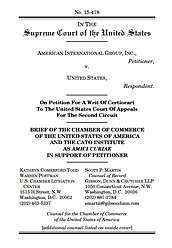Learn more about Cato’s Amicus Briefs Program.
The IRS recently blitzed American International Group (better known as “AIG”) with an unpredictable, retroactive challenge regarding income earned in foreign countries. The IRS denied AIG its foreign-tax credit—the amount AIG already paid in foreign taxes—claiming that AIG’s cross-border transactions were made for tax purposes only, without any “economic substance.” In a particularly aggressive departure from long-standing precedent, the tax man saddled AIG with the burden of proving the legitimacy of its motives. The U.S. Court of Appeals for the Second Circuit agreed with the IRS, concluding that the transactions were “profitless” (meaning lacking in business purpose). This conclusion, however, was born out of a misapplication of standard tax-accounting rules and a misinterpretation of the reason for granting credits for foreign taxes: avoiding double-taxation. Here, denying AIG its foreign-tax credit results in a double tax on the foreign income. The court’s holding also deepens an existing circuit split. Cato has thus joined the U.S. Chamber of Commerce on an amicus brief supporting a request that the Supreme Court take the case. We illustrate the problems that the Second Circuit’s approach would create for companies doing business abroad. The dispute surrounds that “economic substance” test; transactions done purely to avoid paying taxes may or may not be respected when it comes to the foreign-tax credit. The lower the pre-tax profit, the less economic substance the transaction is presumed to have had—and if the foreign taxes are characterized as expenses rather than taxes, then the transaction’s pre-tax profit is, by definition, lowered. In short, the Second Circuit (along with the Federal Circuit), unlike the Fifth and Eighth Circuits, considers foreign taxes to be expenses, thereby lowering pre-tax profit, reducing economic substance, and disallowing foreign-tax credits. The Internal Revenue Code’s regulations are Byzantine already, and complying with complicated regulations is costly. If the Second Circuit’s ruling is allowed to stand, it will compound both compliance costs and business uncertainty, trapping U.S. taxpayers engaging in cross-border transactions in legal limbo. Those contemplating international transactions will be hesitant at best. As one can surmise, this state of affairs is bad for everyone, especially the beleaguered American economy. That’s why it’s all the more important that the Supreme Court hear this case, correct the application of the economic-substance rule, and reaffirm the purpose of the U.S. foreign-tax-credit regime—which should at least stop the spread of uncertainty into this (rather large) corner of the economy.

This work is licensed under a Creative Commons Attribution-NonCommercial-ShareAlike 4.0 International License.
